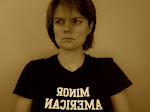and Morocco is rightfully more interesting than heavy-hearted European poets, here is a diary entry from the summer of 1999:
Two Moroccan students, boys, from the university were escaping at the same time we were. They got in the back of the taxi and we got in front. They recognized me from my poetry reading a week or so back, and complimented me on it. I was flattered even though I was quite sure that no one understood a line of it. [It was a group reading/performance with Arabic poets and musicians so the audience was large.]
"I loved how musical it was," one of the boys said, of my reading. It was the right thing to say. I snapped to attention and asked about Moroccan poetry.
He launched into a rhapsodic lecture about Arabic verse. "In Arabic," the other boy interjected, "many words double as both noun and verb -- it's very beautiful." Oh yes, I said, we have this in English too, it creates a beautiful effect. The boys' eyes veritably rolled back in their heads. I was struck by this display of appreciation on a technical matter -- would American undergraduates in the poetry workshops I'd taught react this way? Hardly.
The more talkative boy continued: "We also now have free verse, and the beauty of the language becomes highly important. But I'm worried that poetry is going to lose its audience. Life itself is becoming less beautiful. The language is being degraded, especially by TV, where broadcasters make errors in speaking all the time and no one cares. And French is our second language instead of classical Arabic."
I said that American poetry shared some of these problems. The homogenization of the language through mass media made people more impatient with different ways of writing -- perhaps more beautiful ways. But before I could say that American poets were used to finding ways to write poetry about a world that was, as they said, "less beautiful," the taxi ride was over. We had arrived in Azrou, a dusty, dirty, luminous Berber town where the first order of the day was to give loose change to the widows, cripples and amputees who lingered near the taxi stand.
Wednesday, February 09, 2005
Subscribe to:
Post Comments (Atom)


No comments:
Post a Comment